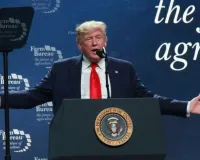Trump’s Another Blow to Foreign Students, OPT Cancellation to Hit 3 Lakh Indians

Plan to scrap OPT program raises serious concerns for international students
Indian students may be forced to return immediately after completing studies
U.S. universities, economy, and workforce likely to face negative impact
U.S. President Donald Trump has once again stirred concern among foreign students by proposing to cancel the Optional Practical Training (OPT) program — a crucial post-study work opportunity for international graduates. A bill with this proposal is reportedly ready, and if passed by Congress, it could jeopardize the future of over 3 lakh Indian students currently studying in American universities.
The OPT program allows international students to work in the U.S. for up to three years after completing their academic courses. This not only provides them valuable industry experience but also opens a pathway to secure an H1B visa. Indian students have especially benefited from this system, often gaining long-term employment in the U.S. through this route.
However, with the proposed scrapping of the OPT, students may be forced to return to India immediately after graduation. This would lead to significant career and financial setbacks, as they would no longer be eligible to work in the U.S. unless they win the highly competitive H1B visa lottery.
Experts warn that the repercussions won't be limited to foreign students alone. The appeal of U.S. universities is significantly tied to post-study work opportunities like OPT. Without it, a sharp decline in international student admissions is expected, which could severely dent the financial health of American universities.
Moreover, American companies could also feel the impact, as they heavily rely on OPT graduates to meet their skilled labor needs. With the limited number of H1B visas available each year, removing OPT would only widen the talent gap in key sectors like technology, engineering, and healthcare.
Stakeholders across the education and corporate sectors are urging policymakers to reconsider, warning that this move could damage the U.S.’s position as a top destination for global talent.












